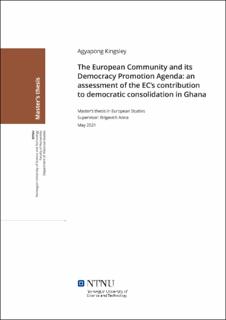| dc.description.abstract | The collapse of the Soviet Union and the Berlin Wall in the late 1980’s gave rise to a new wave of democracy around the world, including Africa. Many sub-Saharan African countries embraced this wave after several failed attempts after independence in the 1960’s. The European Community, through the Lome Convention, Maastricht Treaty and Cotonou Conventions situated democracy promotion in Africa as foreign policy priority. Promoting democracy and human right was thus identified as an essential element of development cooperation. This thesis assesses the EU’s role in the democratization process in Africa, using Ghana as a case study. This thesis relies on journal articles, newspaper articles, EU reports and reports from development programmes for its analysis. It adopts Merkel’s (2008) four level consolidation framework for its analysis. The elements of the framework include institutional consolidation, representative consolidation, behavioural consolidation, and the consolidation of civic and political culture. The argument of this thesis is that except for electoral support, and support for the consolidation of civic culture through civil society organizations, the EU has done little to support democracy consolidation efforts in Ghana, and by extension Africa. Most of the EU support in Africa is in areas such as peace and security, agriculture and rural development, transportation, and infrastructure. Evidence from the allocations by the European Development Fund to sectors such as agriculture and rural development are used to illustrate this point. The rise of China, and the perception of the EU in Africa are discussed as part of the challenges the EU faces in its democracy promotion efforts. The thesis concludes with recommendations to improve EU support for democracy promotion in Africa. The recommendations include clarity on EU priority foreign policy areas as well as increase in EDF allocation for governance projects. | en_US |
